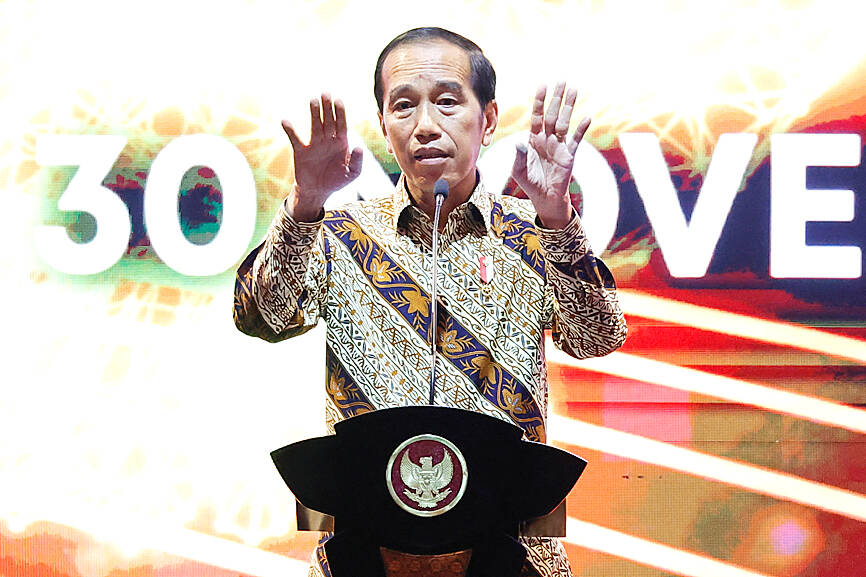Indonesia is to ban bauxite exports from the middle of next year, its latest move aimed at boosting domestic processing of its mineral resources.
Bauxite is an ore used to make aluminum. Indonesia is the world’s sixth-largest producer and holds the fifth-biggest reserves, a US Geological Survey report said. Exports of bleached bauxite are also to be banned.
“Starting from June 2023, the government will impose a ban on exports of bauxite ore and push for development of processed bauxite in the country,” Indonesian President Joko Widodo said in a briefing broadcast on YouTube.

Photo: Reuters
This means the “added value is enjoyed in the country for the progress and welfare of the people,” he said.
Southeast Asia’s largest economy has been pursuing policies designed to create jobs and revenue by processing more of its natural resources at home, rather than just shipping out raw materials.
Jokowi, as the president is known, said this month that Jakarta would not follow a purely open economic model that he blamed for undercutting Latin America’s growth prospects for decades.
Yesterday, he also flagged that there are potentially more prohibitions on raw material shipments coming next year.
Aluminum rose 0.7 percent to US$2,390 a tonne on the London Metal Exchange as of 2:50pm in Singapore yesterday. The metal is used in everything from beverage cans to aircraft and refrigerators.
The Indonesian government has also previously flagged a possible ban on copper concentrate exports, which could hit a global market facing a large shortfall in supply as the energy transition gathers pace.
Indonesia wrested control of Grasberg, the second-biggest copper mine in the world, from international mining firms, including Freeport-McMoRan Inc, in 2018.
Indonesia has halted bauxite exports before. A ban in 2014 hit China’s aluminum industry hard, as it relied on the Southeast Asian nation for about two-thirds of its overseas supply at the time.
Chinese smelters responded by investing heavily in diversifying their sources of the mineral, particularly from Guinea.
Jakarta has already prohibited nickel ore exports. That has spurred Chinese companies to invest billions of dollars to set up operations on the islands of Sulawesi and Halmahera, where they have built refineries, smelters and a metallurgy school. The value of the country’s nickel exports has since surged.
Still, the move has triggered opposition from importing nations. Following a complaint by the EU, the WTO last month ruled that Indonesia’s ban on nickel ore exports contravened international trade rules. Jakarta is appealing the decision.
The bauxite ban “is unlikely to have any material impact” on the market, as Indonesia produced less than 5 percent of global supplies of the mineral last year, said Jayanta Roy, senior vice president at ICRA Ltd, the Indian unit of Moody’s Investors Service.
“This deficit can potentially be bridged by other large producers like Australia and Guinea,” he said.
The unfavorable global demand outlook for non-ferrous metals would also limit the impact of Indonesia’s move, Roy said.

POWERING UP: PSUs for AI servers made up about 50% of Delta’s total server PSU revenue during the first three quarters of last year, the company said Power supply and electronic components maker Delta Electronics Inc (台達電) reported record-high revenue of NT$161.61 billion (US$5.11 billion) for last quarter and said it remains positive about this quarter. Last quarter’s figure was up 7.6 percent from the previous quarter and 41.51 percent higher than a year earlier, and largely in line with Yuanta Securities Investment Consulting Co’s (元大投顧) forecast of NT$160 billion. Delta’s annual revenue last year rose 31.76 percent year-on-year to NT$554.89 billion, also a record high for the company. Its strong performance reflected continued demand for high-performance power solutions and advanced liquid-cooling products used in artificial intelligence (AI) data centers,

SIZE MATTERS: TSMC started phasing out 8-inch wafer production last year, while Samsung is more aggressively retiring 8-inch capacity, TrendForce said Chipmakers are expected to raise prices of 8-inch wafers by up to 20 percent this year on concern over supply constraints as major contract chipmakers Taiwan Semiconductor Manufacturing Co (TSMC, 台積電) and Samsung Electronics Co gradually retire less advanced wafer capacity, TrendForce Corp (集邦科技) said yesterday. It is the first significant across-the-board price hike since a global semiconductor correction in 2023, the Taipei-based market researcher said in a report. Global 8-inch wafer capacity slid 0.3 percent year-on-year last year, although 8-inch wafer prices still hovered at relatively stable levels throughout the year, TrendForce said. The downward trend is expected to continue this year,

Vincent Wei led fellow Singaporean farmers around an empty Malaysian plot, laying out plans for a greenhouse and rows of leafy vegetables. What he pitched was not just space for crops, but a lifeline for growers struggling to make ends meet in a city-state with high prices and little vacant land. The future agriculture hub is part of a joint special economic zone launched last year by the two neighbors, expected to cost US$123 million and produce 10,000 tonnes of fresh produce annually. It is attracting Singaporean farmers with promises of cheaper land, labor and energy just over the border.

US actor Matthew McConaughey has filed recordings of his image and voice with US patent authorities to protect them from unauthorized usage by artificial intelligence (AI) platforms, a representative said earlier this week. Several video clips and audio recordings were registered by the commercial arm of the Just Keep Livin’ Foundation, a non-profit created by the Oscar-winning actor and his wife, Camila, according to the US Patent and Trademark Office database. Many artists are increasingly concerned about the uncontrolled use of their image via generative AI since the rollout of ChatGPT and other AI-powered tools. Several US states have adopted